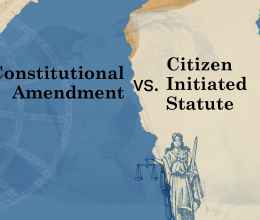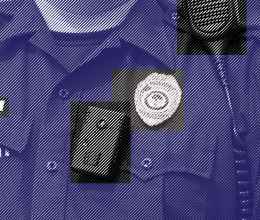Mr. Harris’s case presents a modern case of “debtors prison,” incarcerating someone for inability to pay. James Harris was under court order to pay child support for two minor children. In 2007, Harris lost his job. He tried, unsuccessfully, to modify his child support order based on his unemployment. Evidence supports that Harris spent three years diligently trying to find employment, to no avail. In July 2010, Harris was charged with two felony counts of failure to pay child support. Harris pled guilty in exchange for probation. However, one of the terms of his probation was to pay the back child support he owed, and which Harris was still unable to pay. In March 2011, even though he had finally found a job, the trial court found that Harris had violated probation. Harris was sentenced to one year in prison on one of the counts, and the other count was stayed (so that when Harris finally gets out the probation will continue).
Legal Theory
The U.S. Constitution, Ohio Constitution, and Ohio statutes prohibit incarcerating someone for inability — as opposed to unwillingness — to pay court imposed debts. Therefore, we believe Harris’s one-year sentence is unconstitutional.
Status Update
We are working with the Cuyahoga Public Defender to help Harris present his inability to pay defense in two separate avenues – (1) defending against the criminal nonsupport charges, and (2) modifying the child support orders to reflect his ability to pay so that Harris can avoid further criminal charges.
(1) Defending against the criminal charges – The public defender was appointed to represent Harris, and the ACLU is acting as amicus. Harris moved to vacate his guilty plea so that he could present his inability to pay defense, but his motion was denied by the trial court. Both that denial and the appeal of his one-year sentence are currently pending before the 8th District Court of Appeals. Harris’s appeal brief and our amicus brief in support of Harris’s appeal were filed on July 22, 2011. The county appellee’s brief was filed September 16, 2011. Harris is out on parole on the case for which he was imprisoned and is on probation in the second case, so he remains at risk for being sent back to prison for inability to pay. Oral argument was held on January 30, 2012. On March 1, 2012 the Eighth District Court of Appeals affirmed James Harris’ one year prison sentence as well as the trial court’s decision to not permit him to withdraw his guilty plea. On May 10, 2012 the Court assessed $193 in costs to James Harris.
(2) Modifying the child support orders – The ACLU represents Harris in the juvenile court to help him modify the child support orders. Indigent parents are frequently ‘caught in the system’ when due to changed financial circumstances they can no longer pay the required child support, but they also cannot afford a lawyer to help them modify the support order. This often results in criminal non-support charges against indigent parents, like Harris. Harris is under support orders for two children. After being laid off in 2007, Harris repeatedly tried to get his support orders modified to reflect the change in circumstances based on his unemployment. However, he was unsuccessful. Most recently, Harris filed pro se motions on November 22, 2010 to modify the orders.
(a) A hearing was held July 7, 2011 on the motion to modify for the older child. The court denied the motion on the basis that an appeals court recently ruled that once a child turns 18, the court no longer has authority to modify the order. We disagree. Once a written denial is issued, we will be able to appeal. On February 13, 2012 the Magistrate set the amount Harris has to pay to as $1,000 within 150 days to purge the contempt charge. Harris paid the $1,000 and had a hearing on September 27, 2012. Because Harris paid, the court purged the contempt charge.
(b) A hearing was scheduled on August 29, 2011, on the motion to modify for the younger child. However, the hearing had to be rescheduled, because parties have been unable to locate the child’s mother in order to properly serve her with the motion to modify. The October 11, 2011 hearing, which had to be rescheduled to March 6, 2012 because the child’s mother still could not be located, has once again been delayed as the prosecutor has still not located the mother. We filed a motion to join Cuyahoga Support Enforcement Agency (CSEA) as a party to force them to divulge the mother’s address. At the March 6, 2012 hearing, the court provided us with the mother’s address, and we filed instructions with the court for service on the mother at her last known address. If the mother is not located we may have to charge CSEA with contempt. On April 25, 2012 we again filed instructions for service with the Court to serve on the child’s mother including her last known address. Service was perfected on the mother, and a hearing was held on September 24, 2012 at which the mother appeared. Harris’ motion to modify was granted, and his support payment will be reconfigured and minimum wage will be imputed on Harris’ prior payment obligations. The next court date is tentatively scheduled for November 29, 2012. On November 29, 2012, the Prosecutor’s Office conceded that they had not received income documentation from the mother and, despite the fact that they had agreed to obtain that information during the prior hearing, they were not prepared to agree to a modified order. They further indicated that they did not feel that it was their responsibility to provide that information since they normally do not get involved in modification issues. To address this issue, the Court continued the hearing and we were finally able to obtain the mother’s income records. We were able to get the mother to sign an agreed judgment entry modifying support to an amount which imputed minimum wage for the time Harris was not employed, retroactive to when Harris first filed for modification. The Prosecutor reviewed the judgment entry and found that it will be acceptable for approval by the support enforcement agency. Our involvement in the case has ended.








